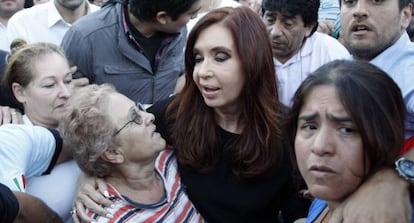Cash-laundering charge mires president and pinup’s husband
Journalist claims Kirchner couple hid some $55 million

Argentinean President Cristina Fernández de Kirchner was this week trying to dodge more questions regarding her personal wealth after a well-known investigative journalist accused an influential businessman of helping her and her late husband launder some 55 million euros abroad.
The government has not officially responded to the allegations, which have appeared in the nation’s dailies and have ignited at least five complaints by the opposition, who are calling for a judicial investigation.
During a ceremony on Tuesday in which she announced a new social project, Fernández de Kirchner didn’t mention the growing controversy.
But the businessman in question, Lázaro Báez, accused the well-known journalist of “creating a media circus” and “confusing” his audience with the accusations.
In his television program Journalism for Everyone (PPT), which was broadcast on Sunday, Jorge Lanata presented a series of hidden-camera interviews with witnesses who claimed they helped Báez — voluntarily or due to threats — to transfer funds outside the country on behalf of Fernández de Kirchner and her husband, the late President Néstor Kirchner.
One of the witnesses was businessman Leonardo Fariña, who became well-known in Argentina following his marriage to pinup model Karina Jelinek in 2011.
“I managed a fortune of about $5 billion,” Fariña was recorded as saying. “You have no idea the structure that Néstor has built. I can tell you, that guy managed everything.”
According to the Buenos Aires daily La Nación, Jelinek, a popular figure in the celebrity circuit, walked out of her home on Monday night after her husband’s name surfaced in the scandal.
On Monday, Fariña told another television program that there was no hidden camera — he knew that they were recording him — and all of what he told Lanata was untrue.
“Lanata wanted fiction, so I gave him fiction,” he said.
When asked about Fariña’s version, Lanata said: “Tell him to watch my show this Sunday. Hearty greetings to him.”
The wealth of the president and her late husband has been the subject of ongoing speculation since the political power couple emerged as national leaders of the faction within the Peronist party that identified themselves as “Kirchnerites.”
In December 2010, WikiLeaks released a US State Department cable written in 2007 by then-US Ambassador Vilma Martínez, who complained to Washington that the Kirchner government was not cooperating with US authorities in cracking down on money launderers.
“Some Embassy contacts argue that the current [Argentinean] leadership, including the president, stands to lose from the honest and vigorous pursuit of money laundering,” wrote Martínez, adding that most money laundering in Argentina is the product of tax evasion and political corruption but not terrorism financing.
“The Kirchners and their circle simply have too much to gain themselves from continued lax enforcement,” she added.
Néstor Kirchner, a former governor of Santa Cruz province and for many years a powerful political boss in the southern part of the country, was elected president in 2003 while his wife served in Congress.
She ran and won the presidential race following her husband’s term and became president in 2007. Néstor Kirchner, who many believed would succeed her in the presidency, died suddenly in 2010 of a massive heart attack.
According to the allegations, Báez, along with others, helped the Kirchners transport cash in private planes to tax havens abroad, including Switzerland and Belize.
Báez, who owns the newspaper Prensa Libre, accused PPT and its parent media sponsor Grupo Clarín in an editorial of conducting “a new assault” on the government with allegations that are not the subject of any judicial investigation.
The Clarín media group and the government have been engaged in a bitter public war since Fernández de Kirchner came to office. The daily Clarín and other affiliated media have been critical of the government. At the same time, the president has initiated measures to break up media monopolies in her country.
Tu suscripción se está usando en otro dispositivo
¿Quieres añadir otro usuario a tu suscripción?
Si continúas leyendo en este dispositivo, no se podrá leer en el otro.
FlechaTu suscripción se está usando en otro dispositivo y solo puedes acceder a EL PAÍS desde un dispositivo a la vez.
Si quieres compartir tu cuenta, cambia tu suscripción a la modalidad Premium, así podrás añadir otro usuario. Cada uno accederá con su propia cuenta de email, lo que os permitirá personalizar vuestra experiencia en EL PAÍS.
¿Tienes una suscripción de empresa? Accede aquí para contratar más cuentas.
En el caso de no saber quién está usando tu cuenta, te recomendamos cambiar tu contraseña aquí.
Si decides continuar compartiendo tu cuenta, este mensaje se mostrará en tu dispositivo y en el de la otra persona que está usando tu cuenta de forma indefinida, afectando a tu experiencia de lectura. Puedes consultar aquí los términos y condiciones de la suscripción digital.








































